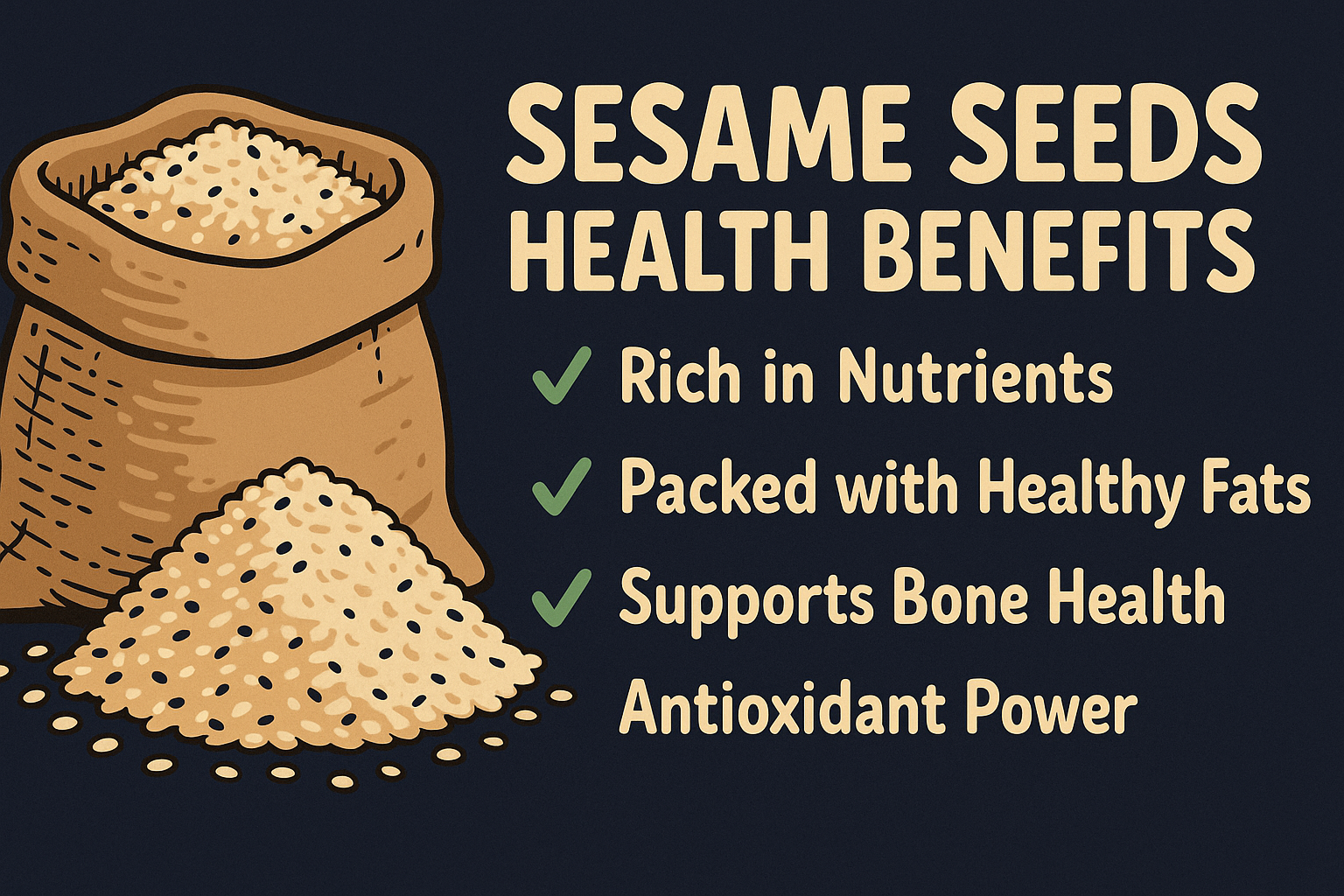Sesame Seeds Health Benefits
If you’re looking for an easy, natural way to boost your nutrition without overhauling your diet, sesame seeds might be the answer. These tiny seeds are bursting with vitamins, minerals, and powerful plant compounds that support everything from your heart to your bones. Whether you enjoy them sprinkled on salads, blended into tahini, or baked into bread, sesame seeds pack a surprising health punch.
In this article, we’ll break down the top sesame seeds health benefits, the differences between black and white varieties, and how to get more of them into your diet.
🌟 Top Health Benefits of Sesame Seeds
✅ 1. Bone Health Support
Sesame seeds are rich in calcium, magnesium, zinc, and phosphorus—all vital for strong bones and preventing age-related bone loss. Just one tablespoon of unhulled sesame seeds contains around 88 mg of calcium, making them one of the best plant-based sources of this essential mineral.
❤️ 2. Heart Health Booster
These seeds are loaded with healthy fats, including polyunsaturated and monounsaturated fats that help lower bad LDL cholesterol and increase good HDL cholesterol. Sesame also contains sesamin and sesamol, two lignans that act as antioxidants and have cholesterol-lowering effects.
🩺 3. Blood Pressure Regulation
Thanks to their magnesium and lignan content, sesame seeds may help reduce high blood pressure—a major risk factor for heart disease and stroke. Studies suggest that daily sesame seed intake can lead to modest reductions in systolic and diastolic pressure.
🧠 4. Brain and Mood Enhancer
Sesame seeds are a natural source of tyrosine, an amino acid used to produce dopamine, a brain chemical that influences mood and motivation. Their healthy fat and vitamin B1 content also support brain function and nerve health.
🔥 5. Anti-Inflammatory Effects
Chronic inflammation is linked to countless health problems, from arthritis to metabolic disease. Sesame’s natural oils and antioxidants—especially sesamol—have shown anti-inflammatory properties in various studies, making them a smart choice for managing pain and long-term health.
🧬 6. Powerful Antioxidants
Antioxidants protect your cells from oxidative stress, which can accelerate aging and contribute to chronic diseases. Sesame seeds are rich in lignans, vitamin E, and unique antioxidants like sesamin, giving them a protective edge against cell damage.
🧘♀️ 7. Hormone Balance and Menopause Support
Sesame lignans may mimic estrogen in the body, helping ease hormonal imbalances—especially in women going through menopause. Some small studies suggest sesame seeds can help reduce hot flashes and support mood during hormonal shifts.
🩸 8. Iron and Energy
Sesame seeds—especially black sesame—are a good source of plant-based iron, which supports red blood cell production and helps combat fatigue and low energy, particularly in vegetarians and older adults.
⚫ Black vs White Sesame Seeds: What’s the Difference?
While both types come from the same plant family, black and white sesame seeds offer slightly different nutritional profiles and health benefits.
| Feature | White Sesame Seeds | Black Sesame Seeds |
|---|---|---|
| Taste | Mild, nutty | Stronger, earthier, slightly bitter |
| Calcium (hulled) | Lower | Higher |
| Iron | Moderate | Higher |
| Antioxidants | High | Even higher (especially sesamin and anthocyanins) |
| Common Uses | Breads, salads, tahini | Asian dishes, desserts, traditional medicine |
| Colour after grinding | Creamy white (tahini) | Dark, greyish-black |
Summary:
- White sesame seeds (hulled or unhulled) are great for general use, offering plenty of calcium and healthy fats.
- Black sesame seeds are slightly more bitter but provide more iron, more antioxidants, and are often used in traditional Eastern medicine for hair health, anti-aging, and boosting energy.
🍽️ How to Eat Sesame Seeds
There are dozens of easy ways to add sesame seeds into your diet. Here are a few ideas:
- Sprinkle on porridge, yogurt, or avocado toast
- Add to salads, stir-fries, or noodle bowls
- Use tahini (ground sesame paste) in hummus or salad dressings
- Bake into breads, crackers, and muffins
- Try black sesame powder in smoothies or hot drinks for a nutty, earthy flavour
⚠️ Tip: To absorb more nutrients, lightly toast or grind the seeds before eating.
⚠️ Cautions and Considerations
- High in calories – A tablespoon of sesame seeds contains about 90 calories. A little goes a long way!
- Allergens – Sesame is a common allergen. Avoid if you have a sesame allergy.
- Interactions – If you take blood pressure meds or blood thinners (like warfarin), check with your doctor before consuming large amounts.
🧾 Final Thoughts
Sesame seeds may be tiny, but they deliver big when it comes to health benefits. Whether you’re aiming to improve your bone density, boost heart health, balance hormones, or simply get more antioxidants in your diet, sesame seeds deserve a place in your pantry.
Want the best of both worlds? Use white sesame seeds for everyday meals and black sesame seeds when you want a potent antioxidant or iron-rich boost.

👉 Like this article? Share it on Facebook 💬
➡️ Join our private Facebook group here! [Join Now]

Leave a Reply